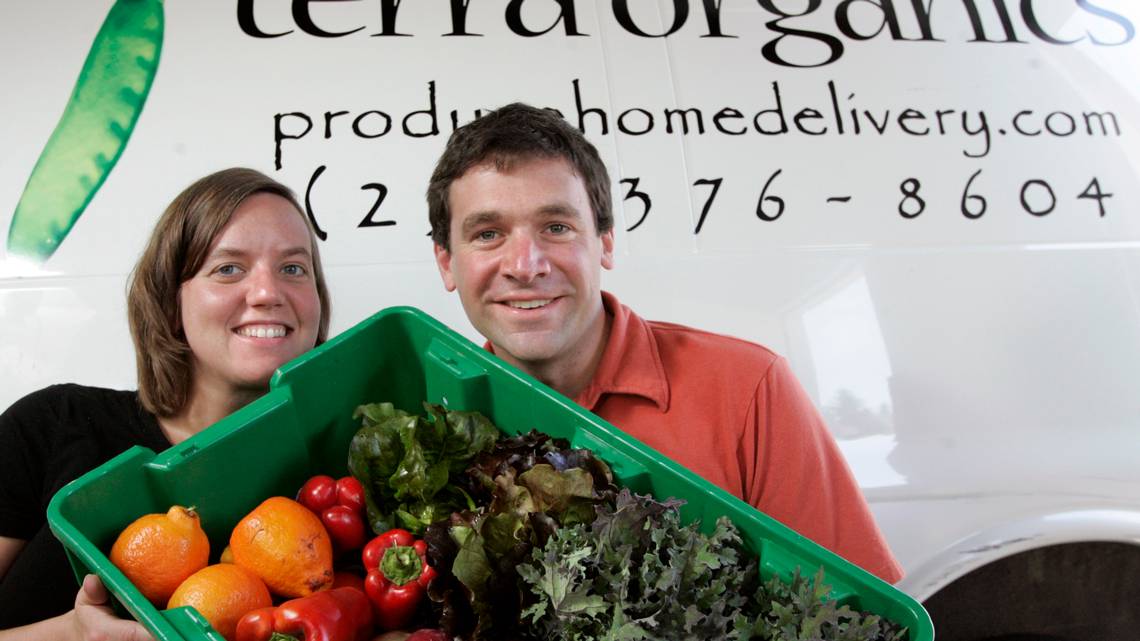The News Tribune: If you care about local, organic produce, learn a lesson from these farmers

Kim and Dan Hulse run Terra Organics, a produce home delivery business out of their warehouse in East Tacoma. They gather organic produce from local farms and then distribute to customers weekly. Photo taken at their warehouse, Monday June 16, 2008.(Janet Jensen/The News Tribune) Russ Carmack
by Matt Driscoll | September 10, 2018
For more than a decade, Dan Hulse — the owner of Terra Organics — built a business on trying to bring local, organic produce to Tacoma and the South Sound.
The vision included purchasing a farm near Orting in 2009 with his wife, Kim, and developing a distribution network that delivered fruits, vegetables and other goodies to homes throughout the region.
For a while, especially in the early days of the organic farm-to-table movement, it seemed like a winning idea.
More recently, things started to change.
Increasingly inhospitable market forces, Hulse says — including big grocers hopping on the organic or home delivery bandwagon and the arrival of a Silicon Valley startup that delivers produce straight to your door— took their toll.
That’s why, late last month, Hulse reluctantly threw in the towel.
For many in this area, the news hit hard and represented the end an era.
“It just never came to fruition,” Hulse said last week of his vision and its failure to fully materialize. “It had been a couple years of just seeing all these warning signs.
“It ended up feeling like more of a grind and that there wasn’t as much appreciation or reason to stay in it, because it’s just such a hard thing to do.”
Of course, your view on this likely depends on where you’re standing.
To some, it likely will read as nothing more than capitalism at work, a business model that was bested by advantageous competitors doing what Terra Organics was trying to do, only cheaper and more conveniently.
To others, it will resonate as another example of the little guy — and the little farms — being mauled by profit-minded big dogs with little regard for the kind of small-time, local, agricultural ethics that made people turn to Terra Organics in the first place.
The tricky thing is, it might be all of the above.
For consumers, perhaps the question is the same as it’s always been: What kind of business do you want to support?
While Hulse was quick to note there wasn’t one factor that led to Terra Organic’s demise, he did acknowledge that the recent emergence of Imperfect Produce certainly didn’t help. That company now operates and delivers in markets across the country and sells customers on the idea that their orders help prevent “ugly” produce from becoming waste.
In an economic landscape ripe with so-called disruptors, Imperfect Produce is a particularly interesting one. Like Terra Organics, part of the appeal is a moral one. Peruse Instagram or Facebook these days and it’s not uncommon to see someone posting photos of their odd looking apples or asparagus, touting both the financial savings and the fact that their purchase helped keep the food out of compost bins.
Still, critics have emerged. Some point out that Imperfect Produce, while using some local farms, also relies on bigger farms to meet its increasing needs. Others have questioned just how much waste is actually being prevented, with some even arguing that less picturesque produce has historically gone to food banks.
Ben Simon, the CEO and co-founder of Imperfect Produce, said that reducing food waste is “extremely important” to him. It’s the reason he started the company three years ago, he said, and the reason Imperfect Produce expanded to the Puget Sound region last October.
While Simon would not comment on the amount of financial backing Imperfect Produce has at its disposal, he did call the contention that the company is passing off food that would otherwise go to food banks a “lie … that’s pretty easily proven false.” He pointed to a report from Feeding America, which describes itself as “the nation’s largest domestic hunger-relief organization,” to back him up.
“After what goes to food banks every year, there’s an additional 20 billion pounds of perfectly good fruits and vegetables that’s rotting on farms every year,” Simon said. “It’s a tremendous issue.”
When asked about Terra Organics, Simon — who says his first job in high school was at a farm in Maryland — said that seeing a “great CSA” go out of business is “absolutely heartbreaking.”
At the same time, Simon was blunt when it comes to the economics of it.
“There are a lot of market forces at play right now. What this means is that a lot of new players are entering the space,” Simon said. “Historically, if you think about it, when CSAs started, they were the first-ever model to take farmers and connect them directly to people and get fresh produce to farms to people’s doors.
“These days, with the internet … the space is heating up and it’s getting complicated. We won’t lie. There’s a lot of excitement around what we’re doing.”
On the other end of the spectrum, Katie Green is the owner of Wild Hare Organic Farm on River Road.
Green doesn’t have venture capital behind her, but she does have a farm, and feels good about where her business model stands. While she acknowledges the uncertainty in her industry, she believes Wild Hare has found a niche and the things that make her business unique will help her survive.
“We do hope that the unique and special will outweigh the convenience,” Green said. “That’s what sets us apart.”